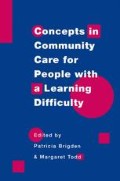Abstract
The use of psychotherapy with clients with learning difficulties is a relatively recent development which has occurred over the past ten years. The first publication in relation to using this approach with this client group was in 1981. Following this much work has been undertaken by the Tavistock Clinic. In addition to this a number of people have become interested in the use of psychotherapy with people with learning difficulties (Cole 1989; Marler & Carroll-Williams 1989; Humphreys et al. 1990). As people with learning difficulties strive to reach their maximum potential they will increasingly need access to the full range of therapies which is available to everyone in the population. This could lead to an increase in demand for this type of service. This chapter will explore some models of psychotherapeutic intervention and will consider a case study in detail to indicate the practical applicability of psychotherapy. The case study presented is a young person with mild learning difficulties. As yet much of the psychotherapeutic work is carried out with people with mild and moderate learning difficulties. However, as therapists become more skilled it may be possible to use this intervention with clients with severe learning difficulties.
Preview
Unable to display preview. Download preview PDF.
References
Bloch, S. (1981). An introduction to the psychotherapies. Oxford University Press, Oxford.
Bloch, S. (1982). What is psychotherapy? Oxford University Press, Oxford.
Brandon, D. (1989). Mutual Respect. Good Impressions, London.
Cole, A. (1989). Groupwork with people who have mental handicaps. Mental Handicap. September.
Corney, M. (1986). A lost child lives on. New Forum. 21 (6), 12–15.
Frank, J. (1974). A comparative study of psychotherapy. Persuasion and healing. Schocken Books, London.
Freud, S. (1934). Psychopathology of everyday life. Penguin, London.
Foulkes, S. and Anthony, E. (1957). Group psychotherapy: The psycho-analytic approach. Penguin, London.
Fromm-Reichmann, F. (1960). Principles of intensive psychotherapy. University of Chicago Press, Chicago.
Gardner, J. and O’Brien, J. (1990). The principle of normalisation programme issues in developmental disabilities: A guide to effective habilitation and active treatment. Paul H. Brooks, Baltimore.
Grunewald, K. (1983). Emotional responses of mentally handicapped people. Report of the sixteenth spring conference on Mental Retardation. University of Exeter, Exeter.
Holmes, J. and Lindley, R. (1989). The value of psychotherapy. Oxford University Press, Oxford.
Humphreys, M., Hill, L. and Valentine, S. (1990). A psychotherapy group for young adults with mental handicaps. Problems encountered. Mental Handicap. September.
McKenna, H. (1990). Treat with caution. Nursing Times 86 (11).
Marler, R. and Carroll-Williams, B. (1989). Groupwork on life events and sexuality with adults living in a mental handicap hospital. Mental Handicap. September.
Observer (1988). Observer Magazine, 8 March.
Orgler, H. (1973). Alfred Adler — The man and his work. Sidgwick and Jackson, London.
Pedder, J. (1989). Courses in psychotherapy: Evolution and current trends. British Journal of Psychotherapy. 6 (2).
Rowan, J. (1983). The reality game — A guide to humanistic counselling and therapy. Routledge and Kegan Paul, London.
Rutter, M. (1982). Psychological therapies in child psychiatry: issues and prospects. Psychological Medicine. 21, 723–40.
Rycroft, C. (1986). A critical dictionary of psychoanalysis. Penguin, London.
Salzberger-Wittenberg, I. (1970). Psycho-analytic insight and relationships: A Kleinian approach. Routledge and Kegan Paul, London.
Sinason, V. (1989). Psychoanalytical psychotherapy and its application. Group for the Advancement of Psychodynamics and Psychotherapy in Social Work 4 (1).
Szivos, S. and Griffiths, E. (1989). Group processes involved in coming to terms with a mentally retarded identity. Mental Retardation. 28 (6).
Yalom, I. (1985). The theory and practice of group psychotherapy. Basic Books, USA.
Editor information
Editors and Affiliations
Copyright information
© 1993 The contributors
About this chapter
Cite this chapter
Taylor, T. (1993). Psychotherapeutic approaches with people with learning difficulties. In: Brigden, P., Todd, M. (eds) Concepts in community care for people with a learning difficulty. Palgrave, London. https://doi.org/10.1007/978-1-349-12863-1_8
Download citation
DOI: https://doi.org/10.1007/978-1-349-12863-1_8
Publisher Name: Palgrave, London
Print ISBN: 978-0-333-57246-7
Online ISBN: 978-1-349-12863-1
eBook Packages: MedicineMedicine (R0)

